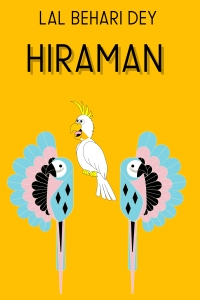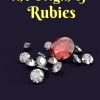
There was a fowler who had a wife. The fowler’s wife said to her husband one day, “My dear, I’ll tell you the reason why we are always in want. It is because you sell every bird you catch by your rods, whereas if we sometimes eat some of the birds you catch, we are sure to have better luck. I propose therefore that whatever birds you bag today we do not sell, but dress and eat.”
The fowler agreed to his wife’s proposal and went out bird-catching. He went about from wood to wood with his limed rods, accompanied by his wife, but in vain. Somehow or other, they did not succeed in catching any bird till near sundown. But just as they were returning homewards, they caught a beautiful hiraman. The fowler’s wife, taking the bird in her hand and feeling it all over, said, “What a small bird this is! How much meat can it have? There is no use in killing it.”
The hiraman said, “Mother, do not kill me, but take me to the king, and you will get a large sum of money by selling me.” The fowler and his wife were greatly taken aback on hearing the bird speak, and they asked the bird what price they should set upon it. The hiraman answered, “Leave that to me; take me to the king and offer me for sale. When the king asks my price, say, ‘The bird will tell its own price,’ And then I’ll mention a large sum.”
The fowler accordingly went the next day to the king’s palace and offered the bird for sale. The king, delighted with the beauty of the bird, asked the fowler his price. The fowler said, “O great king, the bird will tell its own price.”
“What! can the bird speak?” asked the king.
“Yes, my lord. Be pleased to ask the bird its price,” replied the fowler. Half in jest and half in seriousness, the king said, “Well, hiraman, what is your price?”
The hiraman answered, “Please your majesty, my price is ten thousand rupees. Do not think that the price is too high. Count out the money for the fowler, for I’ll be of the greatest service to your majesty.”
“What service can you be of to me, hiraman?” asked the king. “Your majesty will see that in due time,” replied the hiraman. The king, surprised beyond measure at hearing the hiraman talk, and talk so sensibly, took the bird and ordered his treasurer to tell down the sum of ten thousand rupees to the fowler.
The king had six queens, but he was so taken up with the bird that he almost forgot that they lived. At any rate, his days and nights were spent in the company, not of the queens, but the bird. The hiraman not only replied intelligently to every question the king put, but it recited to him the names of the three hundred and thirty million gods of the Hindu pantheon, the hearing of which is always regarded as an act of piety. The queens who felt that they were neglected by the king, became jealous of the bird, and determined to kill it. It was long before they got an opportunity, as the bird was the king’s inseparable companion.
One day the king went out hunting, and he was to be away from the palace for two days. The six queens determined to avail themselves of the opportunity and put an end to the life of the bird. They said to one another, “Let us go and ask the bird which of us is the ugliest in his estimation, and she whom he pronounces the ugliest shall strangle the bird.” Thus resolved, they all went into the room where the bird was. But before the queens could put any questions, the bird so sweetly and so piously recited the names of the gods and goddesses that the hearts of them all melted into tenderness, and they came away without accomplishing their purpose. The following day, however, their evil genius returned, and they called themselves a thousand fools for having been diverted from their purpose. They, therefore, determined to steel their hearts against all pity and to kill the bird without delay. They all went into the room and said to the bird, “O hiraman, you are a very wise bird, we hear, and your judgments are all right; will you please tell us which of us is the handsomest and which the ugliest?” Knowing the evil design of the queens, the bird said to them, “How can I answer your questions remaining in this cage? In order to pronounce a correct judgment, I must look minutely on every limb of you all, both in front and behind. If you wish to know my opinion you must set me free.” The women were at first afraid of setting the bird free lest it should fly away. But on second thoughts, they set it free after shutting all the doors and windows of the room. The bird, on examining the room, saw that it had a water passage through which it was possible to escape. When the question was repeated several times by the queens, the bird said, “Not one of you can be compared to the beauty of the little toe of the lady that lives beyond the seven oceans and the thirteen rivers.” The queens, on hearing their beauty spoken of in such slighting terms, became exceedingly furious and rushed towards the bird to tear it in pieces. But before they could get at it, it escaped through the water passage and took shelter in a woodcutter’s hut which was close by.
The next day the king returned home from hunting, and not finding the hiraman on its perch, became mad with grief. He asked the queens, and they told him that they knew nothing about it. The king wept day and night for the bird, as he loved it much. His ministers became afraid lest his reason should give way, for he used every hour of the day to weep, saying, “O my hiraman! O my hiraman! where have you gone?” A proclamation was made by beat of drum throughout the kingdom that if any person could produce before the king his pet hiraman, he would be rewarded with ten thousand rupees. The woodcutter rejoiced at the idea of becoming independent for life, produced the precious bird, and obtained the reward. The king, on hearing from the parrot that the queens had attempted to kill it, became mad with rage. He ordered them to be driven away from the palace and put in a desert place without food. The king’s order was obeyed, and it was rumoured after a few days that the poor queens were all devoured by wild beasts.
After some time, the king asked the parrot, “Hiraman, you said to the queens that none of them could be compared to the beauty of even the little toe of the lady who lives on the other side of the seven oceans and thirteen rivers. Do you know of any means by which I can get at that lady?”
Hiraman replied, “Of course, I do. I can take your majesty to the door of the palace in which that lady of peerless beauty lives. If your majesty will abide by my counsel, I will undertake to put that lady into your arms.”
“I will do whatever you tell me. What do you wish me to do?”
The Hiraman began his instructions, “What is required is a pakshiraj. If you can procure a horse of that species, you can ride upon it, and in no time, we shall cross the seven oceans and thirteen rivers and stand at the door of the lady’s palace.”
“I have, as you know, a large stable of horses. We can now go and see if there are any pakshirajes amongst them,” the king said.
The king and the hiraman went to the royal stables and examined all the horses. The hiraman passed by all the fine-looking horses and those of high mettle, and alighted upon a wretched-looking lean pony, and said, “Here is the horse I want. It is a horse of the genuine pakshiraj breed, but it must be fed full six months with the finest grain before it can answer our purpose.” The king accordingly put that pony in a stable by itself, and himself saw every day that it was fed with the finest grain that could be got in the kingdom. The pony rapidly improved in appearance, and at the end of six months, the hiraman pronounced it fit for service. The parrot then told the king to order the royal silversmith to make some khais of silver. A large quantity of silver khais was made in a short time. When about to start their aerial journey, the hiraman said to the king, “I have one request to make. Please whip the horse only once at starting. If you whip him more than once, we shall not be able to reach the palace, but stick mid-way. And when we return homewards after capturing the lady, you are also to whip the horse only once. If you whip him more than once, we shall come only half the way and remain there.” The king then got upon the pakshiraj with the hiraman and the silver khais and gently whipped the animal once. The horse shot through the air with the speed of lightning, passed over many countries, kingdoms, and empires crossed the oceans and thirteen rivers and alighted in the evening at the gate of a beautiful palace.
Now, near the palace gate, there stood a lofty tree. The hiraman told the king to put the horse in the stable hard by and then climb into the tree and remain there concealed. The hiraman took the silver khais, and with its beak, began dropping them from the foot of the tree, all the way through corridors and passages, up to the bedchamber of the lady of peerless beauty. After doing this, the hiraman perched upon the tree where the king was concealed. Some hours after midnight, the maid-servant of the lady, who slept in the same room with her, wishing to come out, opened the door and noticed the silver khais lying there. She took up a few of them, and not knowing what they were, showed them to her lady. The lady, admiring the little silver bullets, and wondering how they could have got there, came out of her room and began picking them up. She saw a regular stream of them apparently issuing from near the door of her room and trailing away. She went on picking up in a basket the bright, shining khais all through the corridors and passages till she came to the foot of the tree.
No sooner did the lady of peerless beauty come to the foot of the tree than the king, agreeably to instructions previously given to him by the hiraman, alighted from the tree and caught hold of the lady. In a moment, she was put upon the horse along with himself. The hiraman sat upon the king’s shoulder, the king gently whipped the horse once, and they all were whirled through the air with the speed of lightning. The king, wishing to reach home soon with the precious prize and forgetful of the instructions of the hiraman, whipped the horse again. And the horse at once alighted on the outskirts of what seemed a dense forest. “What have you done, O king?” shouted out the hiraman. “Did I not tell you not to whip the horse more than once? You have whipped him twice, and we are done for. We may meet with our death here.” But the thing was done, and it could not be helped. The pakshiraj became powerless, and the party could not proceed homewards. They dismounted, but they could not see anywhere the habitations of men. They ate some fruits and roots and slept that night there upon the ground.
The next morning it so chanced that the king of that country came to that forest to hunt. As he was pursuing a stag he had pierced with an arrow, he came across the king and the lady of peerless beauty. Struck with the matchless beauty of the lady, he wished to seize her. He whistled, and in a moment, his attendants flocked around him. The lady was made a captive, and her lover, who had brought her from her house on the other side of the seven oceans and thirteen rivers, was not put to death. His eyes were put out, and he was left alone in the forest—alone; and yet not alone, for the good hiraman was with him.
The lady of peerless beauty was taken into the king’s palace, along with the pony of her lover. The lady said to the king that he must not come near her for six months because she had taken a vow which would be completed in that time. She mentioned six months, as that period would be necessary for recruiting the constitution of the pakshiraj. As the lady professed to engage every day in religious ceremonies, due to her vow, a separate house was assigned to her. She took the pakshiraj with her and fed him with the choicest grain. But everything would be fruitless if the lady did not meet the hiraman. But how is she to get a sight of that bird? She adopted the following plan. She ordered her servants to scatter on the roof of her house heaps of paddy, grain, and all sorts of pulse for the refreshment of birds. The consequence was that thousands of the feathery race came to the roof to partake of the abundant feast. The lady was every day on the lookout for her hiraman.
The hiraman, meanwhile, was in great distress in the forest. He had to take care not only of himself but of the now blinded king. He plucked some ripe fruits in the woods and gave them to the king to eat, and he ate of them himself. This was the manner of hiraman’s life. The other birds of the forest spoke thus to the parrot— “O hiraman, you have a miserable life of it in this forest. Why don’t you come with us to an abundant feast provided for us by a pious lady, who scatters mounds of pulse on the roof of her house for the benefit of our race? We go there early in the morning and return in the evening, eating our fill along with thousands of other birds.” The hiraman resolved to accompany them next morning, shrewdly suspecting more in the lady’s charity to birds than the other birds thought there was in it. The hiraman saw the lady and had a long chat with her about the health of the blinded king, the means of curing his blindness, and about her escape. The plan adopted was as follows: The pony would be ready for aerial flight in a short time—for the better part of the six months had already elapsed; and the king’s blindness could be cured if the hiraman could procure from the chicks of the bihangama and bihangami birds, who had their nest on the tree at the gate of the lady’s palace beyond the seven oceans and thirteen rivers, a quantity of their dung, fresh and hot, and apply it to the eyeballs of the blinded king.
The following morning the hiraman started on his errand of mercy. He remained at night on the tree at the palace’s gate beyond the seven oceans and thirteen rivers. Early the next morning, he waited below the birds’ nest with a leaf on his beak, into which dropped the dung of the chicks. That moment the hiraman flew across the oceans and rivers, came to the forest and applied the precious balm to the sightless sockets of the king. The king opened his eyes and saw. In a few days, the pakshiraj was in proper trim. The lady escaped to the forest and took the king up. The lady, king, and hiraman all reached the king’s capital safe and sound. The king and the lady were united together in wedlock. They lived many years together happily and got many sons and daughters. The beautiful hiraman was always with them, reciting the names of the three hundred and thirty million gods.
About the Author







Comments